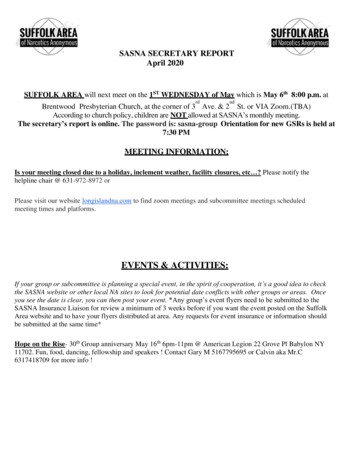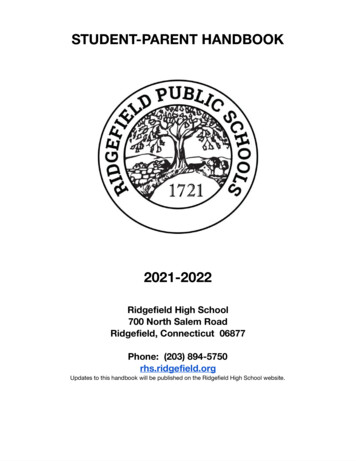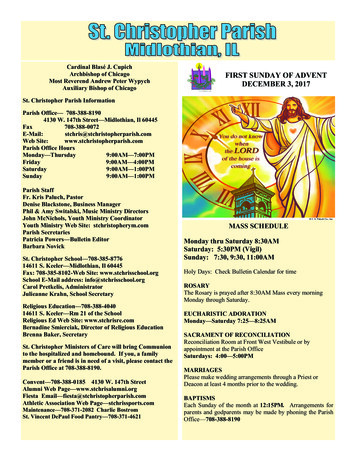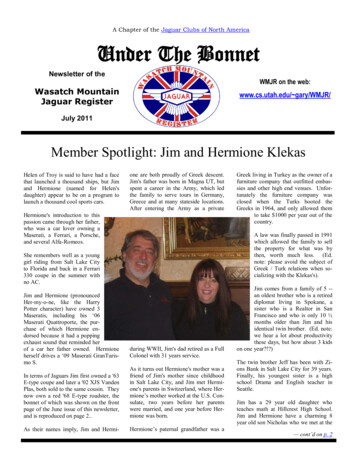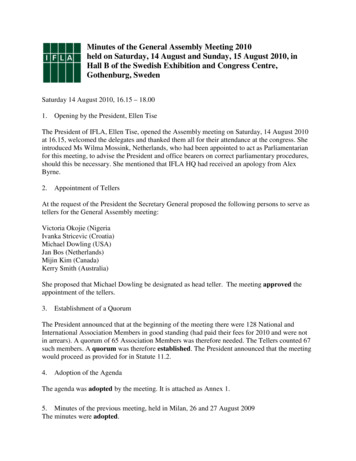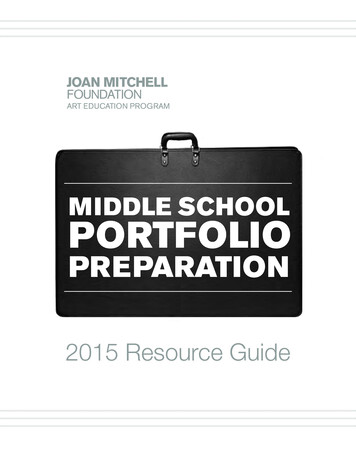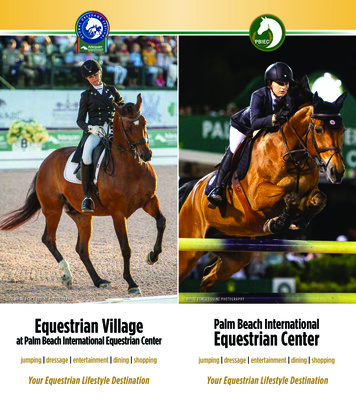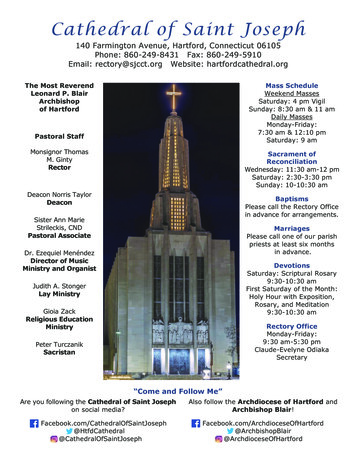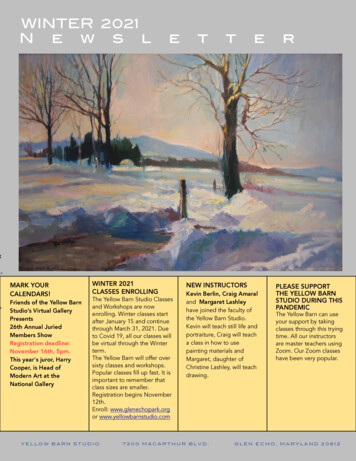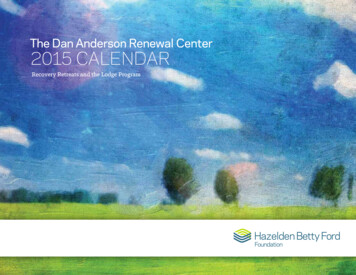
Transcription
Saturday, 7:00–2:00 p.m.Saturday, March 21REGISTRATION, 8:00 a.m.–1:00 p.m.Tampa CC, Ballroom C/D, First LevelExhibits, 10:00 a.m.–1:00 p.m.Tampa CC, Ballroom C/D, First LevelComputer ConnectionTampa CC, Ballroom B, First LevelMeet the CCCC Committees, 9:30 a.m.–10:30 a.m.Tampa CC, Ballroom B, First LevelMovie Screening: Nontraditional, 9:30 a.m.–12:15 p.m.Marriott, Florida Ballroom VI, Level Two(Sponsored by the Veterans Task Force)Meet the CCCC Policy Analysts, 10:45 a.m.–11:30 a.m.Tampa CC, Ballroom B, First LevelMaking and Sharing Knowledge, 11:30 a.m.–1:00 p.m.Tampa CC, Ballroom B, First LevelA Discussion about the 2022 CCCC Vision Statement,1:00 p.m.–2:00 p.m.Tampa CC, Ballroom A, First LevelTWO-YEAR COLLEGE SATURDAY PROGRAMSPONSORED BY THE TWO-YEAR COLLEGE ENGLISHASSOCIATION (TYCA)TWO-YEAR COLLEGE ENGLISH ASSOCIATION ANNUALBREAKFAST AND AWARDSGrand Ballroom F, First Floor7:00 a.m.–8:00 a.m.Admission is by advance registration only.318b187-360-4Cs-2015.indd 3181/29/15 12:10 PM
Saturday, 7:00–8:00 a.m.tyca fame awardThe Award acknowledges the best mention of the two-year college appearing in anymedia during the previous year. The award gives credit to those reporters, writers,filmmakers, and others who seek out and publicize exemplary students, faculty, programs, campuses, and/or recognize the two-year college system. For more information, please visit: http://www.ncte.org/tyca/awards/fame.Winners are to be announced at the TYCA Breakfast.Fame Award CommitteeChair: Joy Barber, Montana State University, BillingsCarmen Carrasquillo, Miramar College, San Diego, CAMichael Dinielli, Chaffey College, Alta Loma, CABruce Henderson, Fullerton College, CAMartha Henning, Portland Community College, ORPaul Humann, Cabrillo/Evergreen Valley Community Colleges, San Jose,CAJeffrey Klausman, Whatcom Community College, Bellingham, WAMandana Mohsenzadegan, Evergreen Valley College, San Jose, CARenee Nelson, DeAnza College, Cupertino, CAMeg O’Rourke, Norco and Fullerton College, CAHoward Tinberg, Bristol Community College, Fall River, MASterling Warner, Evergreen Valley College, San Jose, CAPrevious Award Winners201420132012201120102009Brianna Boyington, “4 Types of People Who Benefit from CommunityColleges,” US News and Report: College Compass, January 29, 2014.Honorable Mention: Tom Snyder, “Community Colleges SupportEntrepreneurs,” The Huffington Post, March 18, 2014.Becky Wai-Ling Packard, “Community Colleges Cannot be Overlookedin America’s Quest for New Scientists,” New York Times, October 19,2012.Honorable Mention #1: Richard Kahlenberg, “Defining CommunityColleges Down,” Chronicle of Higher Education, July 3, 2012.Honorable Mention #2: Elizabeth Dorin, “More High School Graduatesare Choosing Two-year Colleges,” The Post Standard, June 23, 2012.Grace Chen, Community College Review, North Carolina State University,RaleighZach Miners, US News and World Report, October 7, 2010, “ObamaTouts Community Colleges”Scott Jaschik, Inside Higher Ed, March 18, 2009, “College College Surge”Dr. Jill Biden, Northern Virginia Community College, VAHonorable Mention: Peter Schworm, Boston Globe, January 21, 2009,“Brush with Destitution Fuels a Desire to Succeed”CCCC CONVENTION, tampa 2015b187-360-4Cs-2015.indd 3193191/29/15 12:10 PM
Saturday, 7:00–8:00 a.m.diana hacker tyca outstanding programsin english awards for two-year teachersand collegesThe awards are given annually to honor two-year teachers and their colleges for exemplary programs that enhance students’ language learning, helping them to achievetheir college, career, and personal goals. For more information, please visit: http://www.ncte.org/tyca/awards/programs.Winners are to be announced at the TYCA Breakfast.Outstanding Programs Award CommitteeChair: Jeff Andelora, Mesa Community College, AZJudy Angona, Ocean County College, Tom’s River, NJSravani Banerjee, Evergreen Valley College, San Jose, CAPrevious Award Winners2014Reaching Across Borders“Writers’ Community”Aims Community College, Greeley, COEnhancing Developmental Education“Publishing in Developmental Writing”Helena College/University of MontanaFostering Student Success“Developing a Writing Across the Curriculum Program for a Two-YearNursing College”The Christ College of Nursing and Health Sciences, Cincinnati, OHEnhancing Literature and Cultural Arts“Writers@Work”Chattanooga State Community College, TN2013No awards were given.2012Reaching Across Borders“The Program of Global Distinction”Howard Community College, Columbia, MD and Community College ofBaltimore County, MD“Interdisciplinary Service-Learning: Making Connections in Art andWriting for Community Concerns”Kenaij Peninsula College, Soldotna, AKHonorable Mention“Community College–High School Portfolio Connection”320b187-360-4Cs-2015.indd 3201/29/15 12:10 PM
Saturday, 7:00–8:00 a.m.2011Northeast Iowa Community College, PeostaFostering Student Success“Increasing Achievement and Program Completion through CurriculaReform”Passaic County Community College, Paterson, NJReaching Across Borders“The College-Level Writing Collaborative-Navigating the Gap”Johnson & Wales University, Providence, RIHonorable Mention“Reaching Across Borders: The Benefits of Blending Full and Part-TimeFaculty”Madison Area Technical College, WIHonorable Mention“Service Learning and Learning Service: Technical Writing Classes Partnerwith Farmers’ MarketsZane State College, Zanesville, OH)Fostering Student Success“Step UP: Improving Student Success and Retention and Transforming theCollege Culture”Howard Community College, Columbia, MDHonorable Mention“Basic Writing/English 100”Whatcom Community College, Bellingham, WA)Enhancing Developmental EducationHonorable Mention“Rural Comp”Abraham Baldwin Agricultural College, Tifton, GA2010Enhancing Developmental Education“The Accelerated Learning Program (ALP)”Community College of Baltimore County, Baltimore, MarylandHonorable Mention“Portfolio Assessment and Mentoring Program”Camden County College, Blackwood, New Jersey2009Category 1: Reaching Across Borders“Writing in the Disciplines”Montgomery College, Takoma Park, MD“SLCC Community Writing Center”Salt Lake Community College, Salt Lake City, UTHonorable Mention“Ready or Not Writing”Minnesota State Community and Technical College, Fergus Falls, MNSpecial Acknowledgment/Most Unique InitiativeCCCC CONVENTION, tampa 2015b187-360-4Cs-2015.indd 3213211/29/15 12:10 PM
Saturday, 7:00–8:00 a.m.“Intercultural Literacy through Reflection: Rural Students Meet the UrbanExperience”State Fair Community College, Sedalia, MOCategory 2: Fostering Student Success“ESSAI The College of DuPage Anthology of Academic Writing Across theCurriculum”College of DuPage, Glen Ellyn, ILHonorable Mention“Building Community Online: Discussion Boards in a Two-Year CollegeOnline Writing Center”Century College, White Bear Lake, MNCategory 3: Enhancing Developmental Education“Serving the Literacy Goals of At-Risk Students through an IntegratedApproach to Faculty Development and Course Design”Kingsborough Community College, Brooklyn, NYHonorable Mention“Bursting the Bubble: Using Learning Communities to Create AuthenticCollege Learning and Instruction”Front Range Community College, Westminster, COCategory 4: Enhancing Literature and Cultural ArtsNo Entries322b187-360-4Cs-2015.indd 3221/29/15 12:10 PM
Saturday, 7:00–8:00 a.m.Concurrent Sessions Presented byTwo-Year College FacultyL.01L.01M.05M.17M.17Christian Bednar, North Shore Community College, Danvers, MA,“Danvers Theory, Context, Practice: On Developing and Implementing aRhetorically-Oriented Basic Writing Program at a Public, Open-Access,Community College”Jeremy Branstad, North Shore Community College, Danvers, MA,“Danvers Theory, Context, Practice: On Developing and Implementing aRhetorically-Oriented Basic Writing Program at a Public, Open-Access,Community College”Farah Habib, Bristol Community College, Fall River, MA, “Risks andRewards of Writing Narrative Non-Fiction: Lessons for CompositionCourses”Jennifer Maloy, Queensborough Community College, NY, “A Tale of TwoPlacements: Generation 1.5 Students in ESL and NSE Writing Classes”Kerstin Petersen, State University of New York, Binghamton, “TheChallenges of a First-Year Writing Classroom Including Monolingualand Bilingual Speakers”CCCC CONVENTION, tampa 2015b187-360-4Cs-2015.indd 3233231/29/15 12:10 PM
Saturday, 7:00–8:00 a.m.CCCC ANNUAL BUSINESS/TOWN MEETINGANDCONCURRENT SESSIONS324b187-360-4Cs-2015.indd 3241/29/15 12:10 PM
Saturday, 8:00–9:15 a.m.ANNUAL BUSINESS/TOWN MEETINGMarriott, Grand Ballroom E, Level Two8:00 a.m.–9:15 a.m.All members and newcomers of CCCC are invited to attend and vote at the businessmeeting.CCCC Chair: Adam J. Banks, University of Kentucky, LexingtonCCCC Associate Chair: Joyce Locke Carter, Texas Tech University, LubbockCCCC Assistant Chair: Linda Adler-Kassner, University of California, SantaBarbaraCCCC Immediate Past Chair: Howard Tinberg, Bristol Community College,Fall River, MACCCC Secretary: Dominic DelliCarpini, York College of PennsylvaniaCCCC Executive Secretary/Treasurer: Kent Williamson, NCTE, Urbana, ILCCCC Parliamentarian: Erika Lindemann, University of North Carolina,Chapel HillEstablished Rules for Conduct of the Annual Business Meetingl. All voting members should be properly identified, and only members in goodstanding may vote in the business meeting.2. A quorum of seventy-five members of CCCC in good standing is required for thetransaction of business in this meeting.3. Anyone wishing the floor should go to a microphone and give his or her nameand institution when recognized by the chair.4. If procedural rules are adopted by a majority vote of the members present, a twothirds vote will be required to suspend or amend them.5. Members may offer for discussion and action a sense-of-the-house motion, asspecified in item 4 in the “Basic Rules for the Handling of Resolutions.” Suchmotions, if passed, will be broadcast to the members, not as an official CCCCstatement, but as the wish of the majority of the members voting at the AnnualBusiness Meeting. Sense-of-the-house motions can affect action by the Executive Committee, or another appropriate CCCC body, and can become the substance of a resolution at the next annual convention.6. Sturgis’s Standard Code of Parliamentary Procedure applies on all questions ofprocedure and parliamentary law not specified in the Constitution, Bylaws, orother rules adopted by CCCC.7. The Parliamentarian interprets the rules on parliamentary procedures.8. A secret ballot will be ordered by a motion to vote by secret ballot and an affirmative vote of at least ten members.Procedural Rules Proposed for Adoption at the Annual Business MeetingIn discussion of resolutions and all other items of business except sense-of the-housemotions:CCCC CONVENTION, tampa 2015b187-360-4Cs-2015.indd 3253251/29/15 12:10 PM
Saturday, 8:00–9:15 a.m.a. Three minutes will be allowed for each speaker each time.b. No one may speak a second time on a subject until all who wish to speak havebeen heard.c. The presiding officer will attempt to provide a balance in recognizing pro andcon speakers. If there are no speakers opposing a motion under consideration, thechair may ask the house to move immediately to a vote in order to expedite thebusiness.d. Discussion will be limited to no more than fifteen minutes (not including discussion of amendments) on any main motion or resolution; this time may beextended in ten-minute increments by consent of the body.e. Discussion of an amendment to a motion or resolution will be limited to no morethan ten minutes; this time may be extended in six-minute increments by consentof the body.f. Amendments to amendments will not be accepted, in order to avoid confusion.In discussion of sense-of-the-house motions:a. To be considered for deliberation, a sense-of-the-house motion must be preparedin writing, must not exceed 50 words, and must be submitted to the chair in threecopies before the call for the adoption of the agenda at the beginning of the business meeting. (Brief prefatory statements in explanation of the motion are notpart of the motion and need not be submitted in writing.)b. A sense-of-the-house motion may not be amended, except for editorial changesacceptable to the mover.c. Speakers on sense-of-the-house motions shall be limited to two minutes each,except by dispensation of the chair.d. Discussion of sense-of-the-house motions shall be limited to ten minutes, exceptby dispensation of the chair.Basic Rules for the Handling of Resolutions at the Annual Business Meetingl. A call for resolutions will appear in the February issue of College Compositionand Communication. Proposed resolutions received by the chair of the Resolutions Committee two weeks before the conference require the signature ofonly five conference members; however, additional signatures are welcome as ameans of indicating the base of support for the resolution.2. The function of the Resolutions Committee is to review all resolutions presentedand to prepare resolutions of its own in areas in which it or the Executive Committee believes conference action is needed. Special attention will be given toincluding areas covered in sense-of-the-house motions passed at the last AnnualBusiness Meeting. In reviewing resolutions, the Resolutions Committee is responsible for combining all resolutions that duplicate one another in substanceand for editing all resolutions.326b187-360-4Cs-2015.indd 3261/29/15 12:10 PM
Saturday, 9:00–5:00 p.m.The Resolutions Committee will report all properly submitted resolutions to theAnnual Business Meeting with a recommendation for action.Resolutions that call for conference action in the areas in which the CCCC Constitution assigns authority to the officers or the Executive Committee will be clearlylabeled as advisory to the officers or the Executive Committee.Resolutions of appreciation may be prepared by the CCCC officers and may bepresented by the Resolutions Committee.The Resolutions Committee will hold an open meeting during the Special InterestGroup time period to clarify and discuss these resolutions with concerned conference members. It is especially urgent that the authors of resolutions or their delegates come to this meeting. Although no new resolutions may be added at this time,members suggesting additional resolutions will be informed that they may introducesense-of-the-house motions at the Annual Business Meeting in accordance with therule given in item 4 below. The Resolutions Committee will also have a closed meeting after the open meeting to make such editorial and substantive changes as thedeliberations of the open meeting may suggest.3. As necessary, resolutions will be retyped so that complex changes will be incorporated into the copies of the resolutions distributed at the Annual BusinessMeeting.During the report of the Resolutions Committee at the Annual Business Meeting, one member of the Committee will read the “resolved” portion of each resolution and move its adoption. Adoption will require only a simple majority ofmembers present. Action will be taken on each resolution before the next resolution is presented.The CCCC officers at their post-convention session will determine the dissemination of, and the action to be taken on, all resolutions adopted.4. Members may offer sense-of-the-house motions for discussion and action. Suchmotions, if passed, will be announced to CCCC members, not as official CCCCstatements, but as the will of the majority of members at the Annual BusinessMeeting. Sense-of-the-house motions can affect action by the Executive Committee, or by another appropriate CCCC body, as well as become the substanceof a resolution at the next annual convention. In order to be considered, sense-ofthe-house motions of no more than 50 words must be presented in writing (threecopies) to the chair of the Annual Business Meeting before the adoption of theagenda.TYCA Executive Committee MeetingMarriott, Meeting Room 5, Level Two9:00 a.m.–5:00 p.m.CCCC CONVENTION, tampa 2015b187-360-4Cs-2015.indd 3273271/29/15 12:10 PM
Saturday, 9:30–12:15 p.m.L Sessions: 9:30–10:45 a.m.Meet Your CCCC CommitteesWhat are the CCCC Committees? They are the heart of action at the CCCC. Itis because of committees that we have position statements, award programs,and even the conference itself. We have nearly 20 committees that deal withissues like language, globalization, diversity, intellectual property, assessment,women in the profession, and more. Come talk to your committee members;you can also do some preliminary research on the committees’ activities atwww.ncte.org/cccc/committees.Tampa CC, Ballroom B, First Level9:30–10:30 p.m.FILM SCREENINGNontraditionalMarriott, Florida Ballroom VI, Second Level9:30 a.m.–12:15 p.m.Sponsored by: The CCCC Task for on Veterans328b187-360-4Cs-2015.indd 3281/29/15 12:10 PM
Saturday, 9:30–10:45 a.m.L.01Basic WritingRethinking Basic Writing: New Ideas and PerspectivesThis panel addresses contemporary issues in basic writing.Tampa CC, Room 1, First LevelChair: LauraAnne Carroll-Adler, University of Southern California, LosAngelesSpeakers: Christian Bednar, North Shore Community College, Danvers,MA, “Theory, Context, Practice: On Developing and Implementing aRhetorically-Oriented Basic Writing Program at a Public, Open-Access,Community College”Jeremy Branstad, North Shore Community College, Danvers, MA,“Theory, Context, Practice: On Developing and Implementing aRhetorically-Oriented Basic Writing Program at a Public, Open-Access,Community College”Joyce Inman, University of Southern Mississippi, Hattiesburg, “Queeringthe Thirdspace of Composition”Margaret Hamper, University of Wisconsin-Madison, “From ‘HostileMental Children’ to ‘Strangers in a Strange World’: Basic Writers in theLooking Glass from 1969 to 2013”L.02Community, Civic & PublicForceful Rhetoric, Violent Exclusions: The Ethical Risksof (Trans)National Rhetorical AlliancesBridging transnational and public rhetoric, we examine three cases acrossborders when violence and rhetoric combine to sustain injustice.Tampa CC, Room 3, First LevelChair: Timothy R. Dougherty, West Chester University, PASpeakers: Rachael Shapiro, Syracuse University, NY, “Advocating forOthers: Flattened Narratives and Failed Alliances”Timothy R. Dougherty, West Chester University, PA, “Skirmishingand Settling: The Exclusions of Moral Violence in The Irish World,1874–1877”Tamara Bassam Issak, Syracuse University, NY, “Gitmo, the MuslimMale, and Torture: A Transnational Feminist Reading”Respondent: Jennifer Wingard, University of Houston, TXL.03Community, Civic & PublicCirculate, Amplify, and ‘Selfia’: Digital Moments of Riskand Identity ProductionDigital circulation, amplification, and risk.Tampa CC, Room 5, First LevelChair: Dev Bose, University of Arizona, TucsonCCCC CONVENTION, tampa 2015b187-360-4Cs-2015.indd 3293291/29/15 12:10 PM
Saturday, 9:30–10:45 a.m.Speakers: Steven Kapica, Northeastern University, Boston, MA, “‘Acceptor Reject’: Obscene Art, Digital Circulation, and Kairos”Jennifer Nish, American University of Beirut, Lebanon, “The Risky Genreof the ‘Selfie’: Creativity and Conformity in Public Performances ofIdentity”Kerri Hauman, Transylvania University, Lexington, KY, “FeministRhetoric in Digital Spaces: Considering Risks and Rewards viaVisibility and Amplification”L.04Community, Civic & PublicThe Risks and Rewards of Feminist Methodology inCommunity-Based Learning and ResearchFeminist research methodology manifests in community-based writing/research. Is it being practiced effectively in these spaces?Tampa CC, Room 7, First LevelChair: Molly Scanlon, Nova Southeastern University, Fort Lauderdale, FLSpeakers: Megan O’Neill, Virginia Tech, BlacksburgAllison Brimmer, Nova Southeastern University, Fort Lauderdale, FLKelly Concannon, Nova Southeastern University, Fort Lauderdale, FLMolly Scanlon, Nova Southeastern University, Fort Lauderdale, FLL.05Mutha Werk: The Risk, the Struggle, the Tools of Savingand Honoring Black Women’s LivesThis panel lays bare the risks, rhetorics, and realities of being a Black woman.Marriott, Meeting Room 1, Level TwoChair: Elaine Richardson, The Ohio State University, ColumbusSpeakers: Carmen Kynard, St. John’s University, NYErsula Ore, Arizona State University, PhoenixGwendolyn Pough, Syracuse University, NYL.06Information TechnologiesRewarding Visual Creativity through Production ModeRisks: Using Infographics and Comics to Teach VisualLiteracy and CreativityOur panel attempts to see what affordances exist in teaching production ofinfographics and comics.Tampa CC, Room 9, First LevelChair: Robert Watkins, Iowa State University, AmesSpeakers: Jim Haendiges, Dixie State College of Utah, St. GeorgeCurtis Newbold, Westminster College, Salt Lake City, UTRobert Watkins, Iowa State University, Ames330b187-360-4Cs-2015.indd 3301/29/15 12:10 PM
Saturday, 9:30–10:45 a.m.L.07Information TechnologiesThe Machines Are Reading Our Texts!: Authorship andLife on the Digital MarginsWriting for machines and life in the marginalia.Tampa CC, Room 10, First LevelChair: Candace Epps-Robertson, Michigan State University, East LansingSpeakers: Chris Gerben, Stanford University, CA, “A Graveyard of Words:Authorship, Ownership, and Abandoned Lives of Online Writing”Jeff Naftzinger, Florida State University, Tallahassee, “Life on the Margins:A Case Study of Digital Marginalia in Kathleen Fitzpatrick’s PlannedObsolescence”Heather Lang, Florida State University, Tallahassee, “Life on the Margins:A Case Study of Digital Marginalia in Kathleen Fitzpatrick’s PlannedObsolescence”Kristin Ravel, University of Wisconsin-Milwaukee, “How (and Why) toWrite for Machines”L.08Information TechnologiesRisks and Rewards of Teaching Writing on a GlobalStage: Wikipedia Collaborations, Under-Representations,and Lingering DoubtsThe speakers in this presentation discuss the risks and rewards forcomposition students engaged in Wikipedia writing projects.Tampa CC, Room 11, First LevelChair: Matthew Vetter, Ohio University, AthensSpeakers: Robert Cummings, University of Mississippi, “A LongitudinalReview of Wikipedia in the Composition Classroom”Frances Di Lauro, University of Sydney, Australia, “Transformations inStudents’ Experience of Writing with Wikipedia”Matthew Vetter, Ohio University, Athens, “Making the Local Global:Cultural-Critical Student Projects in Wikipedia”L.09Institutional and ProfessionalRisks and Rewards of University-Wide ProfessionalDevelopment on Teaching WritingWe explore professional development initiatives designed to promote acampus-wide cultural shift in practices of teaching writing.Tampa CC, Room 12, First LevelChair: Wendy Sharer, East Carolina University, GreenvilleCCCC CONVENTION, tampa 2015b187-360-4Cs-2015.indd 3313311/29/15 12:10 PM
Saturday, 9:30–10:45 a.m.Speakers: Christina Bethel, East Carolina University, Greenville,“A Shifting Professional Development Landscape from a Queered‘Pre’-Professional Perspective”Kerri Flinchbaugh, East Carolina University, Greenville, “Somebody’sPet Project? Creating Meaningful Writing and Learning Communities”Tracy Ann Morse, East Carolina University, Greenville, “Using Professional Development Opportunities to Achieve Harmony”Wendy Sharer, East Carolina University, Greenville, “Fostering Collaborative Professional Development through a Writing Liaisons Program”L.10Institutional and ProfessionalMentoring and Training: A Critical Time for GraduateStudentsPanel looks at the mentorship and training of graduate students.Tampa CC, Room 13, First LevelChair: Bill Doyle, University of Tampa, FLSpeakers: Rachel Yeatts, University of North Texas, Denton, “Embeddinga Mentoring Culture through Writing Program Administration”Mike Bunn, University of Southern California, Los Angeles, “Transitioning from ‘Training’ to ‘Mentoring’: Fostering Collaboration withGraduate Student Instructors”Ken Gillam, Missouri State University, Springfield, “Ethical Citizenship,Phronesis, and Modern Relativism in Graduate Teaching AssistantTraining”L.11Innovation and Taking RisksTwenty-Five Years after the “Troubles at Texas”: Learningfrom Linda Brodkey and the Risks of Writing PedagogyThis panel reflects on writing pedagogy 25 years after the “Troubles atTexas,” Linda Brodkey’s censorship case at UT Austin.Tampa CC, Room 14, First LevelChair: Paul Butler, University of Houston, TXSpeakers: Tyler Branson, Texas Christian University, Fort Worth,“Dangerous Documents: ‘Writing about Difference’ and Risk-Takingin Rhetoric and Composition”David Bleich, University of Rochester, NY, “University Censorship of theTeaching of Language”Libby Allison, Texas State University, San Marcos, “The Risk of TeachingWriting in Context: The Lost Rewards of Writing about Difference”Mary Boland, California State University, San Bernardino, “‘A Hero Ain’tNothin’ but a Sandwich’: What We Risk When We Call Linda Brodkeya Hero”Respondent: Shelli Fowler, Virginia Tech, Blacksburg332b187-360-4Cs-2015.indd 3321/29/15 12:10 PM
Saturday, 9:30–10:45 a.m.L.12Innovation and Taking RisksDigitization and Its DiscontentsPresenters consider pedagogical potential and professional consequencesof digital assignments, courses, and scholarship.Tampa CC, Room 15, First LevelChair: Rochelle (Shelley) Rodrigo, Old Dominion University, Norfolk,VASpeakers: Cassandra Bishop, Southern Illinois University, Carbondale,“‘Possimpible’ to Probable: Digital Rhetoric in the Technical WritingClassroom and the Video Résumé”Emily Yasonia, California State University, Los Angeles, “The StoryingWyvernwood Project: Using Digital Archiving to Teach Compositionand Rhetoric”Michael Neal, Florida State University, Tallahassee, “Risking DigitalWriting and Research: Blending the Familiar with the Unfamiliar inDigital Scholarship and Teaching”L.13Innovation and Taking RisksBuilding Interdisciplinarity through Critical ThinkingAssessment: A Report from Five DisciplinesFaculty from five disciplines reflect on promises/pitfalls of redesigningcourses on common, unique critical thinking instruments.Tampa CC, Room 16, First LevelChair: Steven Pearlman, University of Saint Joseph, West Hartford, CTSpeakers: Doreen Soldato, University of Saint Joseph, West Hartford, CTAndrea Levy, University of Saint Joseph, West Hartford, CTIrene Reed, University of Saint Joseph, West Hartford, CTJennifer Cote, University of Saint Joseph, West Hartford, CTDavid Carillo, University of Saint Joseph, West Hartford, CTSteven Pearlman, University of Saint Joseph, West Hartford, CTL.14LanguageTranslation as Writing, Writing as TranslationArgues for seeing translation as a specific form of writing and a model forwriting in composition teaching and scholarship.Tampa CC, Room 18, First LevelChair: Bruce Horner, University of Louisville, KYSpeakers: Bruce Horner, University of Louisville, KY, “TranslatingWriting, (Re)Writing Translation”CCCC CONVENTION, tampa 2015b187-360-4Cs-2015.indd 3333331/29/15 12:10 PM
Saturday, 9:30–10:45 a.m.Christiane K. Donahue, Dartmouth and Université de Lille III, VT, “Wordsfor Other Words and the Nature of Composing”Nancy Bou Ayash, University of Washington, Seattle, “(Re)Writing asCritical Translation: Reflections on the Concrete Labor of TranslingualMeaning-Making”Laura Tetreault, University of Louisville, KY, “Translation as Negotiation:Theorizing the Translation Process in Composition”L.15LanguageMaking Space for Multilingual Risk-Taking: AuthenticatingTeacher and Student Experience in Technical and DigitalEnvironmentsA consideration of multilingual student engagement and success in termsof digital composition, technical writing, and narrative.Tampa CC, Room 19, First LevelChair: Kiernan Julia, Michigan State University, East LansingSpeakers: Justin Whitney, The University of Utah, Salt Lake CityHeather Stone, University of Utah, Salt Lake CityJeffrey Moore, Bowling Green State University, OHEllen Cushman, Michigan State University, East LansingKiernan Julia, Michigan State University, East LansingL.16LanguageRisky Business: Responding to Different ComposingPracticesRisks and rewards in developing different approaches toward composing.Tampa CC, Room 20, First LevelChair: Jennifer Eidum Zinchuk, University of Washington, SeattleSpeakers: Kedra James, North Carolina Wesleyan College, Rocky Mount,“Risky Business: Grading African American English in First-YearWriting Students’ Essays”Helena Hall, University of Illinois at Springfield, “Taking a Risk: UsingIndirect Feedback in the ESL Graduate Composition Classroom”334b187-360-4Cs-2015.indd 3341/29/15 12:10 PM
Saturday, 9:30–10:45 a.m.L.17Professional and Technical WritingDangerous Writing: Addressing Multicultural and “Other”Risky TopicsThis panel discusses dangerous topics like multiculturalism, postmoderntheory, and “other” risky topics.Tampa CC, Room 21, First LevelChair: Jessie Moore, Elon University, NCSpeakers: Robin Gosser, Auburn University, AL, “The Risks of DangerousWriting in Technical Communication”Joseph Bartolotta, University of New Mexico, Albuquerque, “Assessingand Writing about the Myriad of Complex Ethical Issues of Risk andRelationships in Professional Writing Internships”Gregory Wilson, Texas Tech University, Lubbock, “The Modern TechnicalCommunicator as (Post-Postmodern) Discourse Worker”L.18ResearchTransfer and Student Agency: The Risk and Rewards ofNegotiationThis panel examines the role of student agency in negotiating transfer inbasic and first-year writing and WID courses.Tampa CC, Room 22, First LevelChair: Ann Shivers-McNair, University of Washington, SeattleSpeakers: Misty Anne Winzenried, University of Washington, Seattle,“Negotiating Writing in the Disciplines: Transfer of Learning, NewMajors, and Gateway Courses”Ann Shivers-McNair, University of Washington, Seattle, “The SharedLabor of Meaning-Making: Peer Review as a Site for AgentiveNegotiations across Difference”Alison Cardinal, Univers
The Christ College of Nursing and Health Sciences, Cincinnati, OH Enhancing Literature and Cultural Arts "Writers@Work" Chattanooga State Community College, TN 2013 No awards were given. 2012 Reaching Across Borders "The Program of Global Distinction" Howard Community College, Columbia, MD and Community College of Baltimore County, MD
